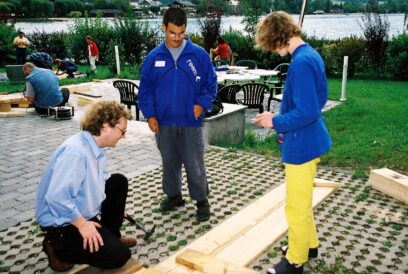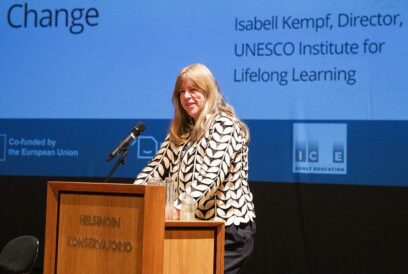

Learning has contributed to the success of inward migration in Leicester, still addressing the inequalities that continue to exist.

With its over 300 000 inhabitants, Leicester is the UK’s tenth largest city. In the adult education community Leicester is best known as the home of NIACE, the National Institute of Adult and Continuing Education.
Photo: Mat Fascione
Leicester is a city in the English Midlands with a population approaching 300,000 people. One of its unique characteristics is that it is the first provincial city in the UK, where there are more black and ethnic minority residents than whites. The City Council is proud of Leicester’s reputation as a tolerant, multicultural place to live, where diversity is celebrated and everyone from whatever background, is respected. This paper will argue that learning has contributed to the successful outcomes of inward migration in Leicester and still has a contribution to make to address the inequalities that stubbornly continue to exist.
Diversity came gradually
The changes in the population of Leicester began in the 1960s with the arrival of people from the Caribbean, followed by significant numbers of migrants from the Indian sub-continent (India, Pakistan and Bangladesh) who came mainly to work in the textile industries. They were later joined by their families. Ugandan Asians fleeing Idi Amin came to Leicester in the 1970s. Asylum seekers and refugees from Iraq, Afghanistan, Zimbabwe and a range of other countries arrived in the last two decades of the twentieth century. Many Somalians who had been living in other EU countries also decided to move to Leicester, and with the enlargement of the EU, migrants from Eastern Europe arrived in larger numbers. The latest national census of the population of the UK, which was carried out in 2010, concluded that Leicester’s population is ‘super-diverse’.
Migrants are not a homogeneous group. They leave their home countries and arrive in their new countries for many different reasons and with many different opportunities, assets or disadvantages. They may be fleeing persecution or poverty, or seeking employment and a better life, or joining their families. They may intend to return home or know that this is unlikely. They may be well educated and qualified or lack basic skills. They may speak or even share the language of the country they are moving to and be familiar with the culture or they may not. However in all cases they will need to learn how to cope and thrive in a new and unfamiliar environment with different social, economic and legal arrangements.
In the case of Leicester, many migrants who arrived in the second half of the twentieth century were helped to settle in by the early pioneers – the first arrivals – particularly those from the Indian sub-continent, who wasted no time in setting up their own organisations in the City. These civil society organisations played and continue to play a vital role in identifying need, campaigning for changes and improvements to public services to meet needs and providing both formal and non-formal learning opportunities for members of the different ethnic minority groups in the City.
Through a combination of civil society action and hard-earned support from the local authorities, the different groups established centres and services in the neighbourhoods where migrant communities came to live and provided the first opportunities to learn English, and understand how to overcome barriers to gaining access to public services. Leicester has a wealth of such organisations that have been established, staffed and managed by the different migrant groups who live in the City. They have developed partnerships with mainstream organisations.
Sadly many community groups have been affected by the economic crisis and the cuts in public spending, which have resulted in a reduction in service, including learning programmes. The full impact of the austerity measures upon communities and voluntary organisations is yet to be felt, but the organisations from different migrant groups are now working together to build new alliances to oppose the cuts.
Learning English is vital
Learning English is recognised by migrant communities, their organisations and Government as vital if migrants are to integrate socially, and prosper in employment. However, the provision of English tuition, known as ESOL (English for the Speakers of Other Languages) in the UK, has been the subject of controversy. In a consultation carried out in Leicester by NIACE, a national NGO that promotes and advocates for the education of adults in England and Wales, ESOL students attending courses run by the City Council reported their many motivations to learn the language.
They wanted to be able to help their children with school work; not have to rely on others when they went shopping or to see health professionals; read newspapers and watch television; gain qualifications; seek and progress in employment; help their neighbours deal with problems that required English; and communicate with the host community. In the past the provision of ESOL classes for adults by local authorities, colleges and voluntary organisations have been provided free of charge to the learners.
As the ability to speak English is clearly valued by some migrants groups, demand for classes has been high and the costs have increased. The Government, while recognising the importance of ESOL, has proposed that free provision should be restricted to those on the lowest incomes. There is considerable evidence that these changes could particularly impact on women who do not have access to the family income to pay for ESOL classes.
In Leicester, while the ESOL programmes have been successful, there is evidence of unmet language learning need among the first generations of migrants and diminishing resources to meet the need. One example of this is among the ‘new’ migrants from the European Union. Eastern European migrants have come to the UK to find employment. As a study undertaken by NIACE on the attitudes of employers to migrants revealed, their skills and work ethic are valued by employers.
However the study found that problems were experienced by employers when the migrants did not understand basic instructions and had to rely upon their co-workers to act as interpreters. Some workers also experienced problems because they did not understand their rights as employees, including the right to a minimum wage. In addition, their progress in the labour market was blocked by poor English language skills.
Tailored teaching
Successful provision of language learning for migrants is based upon addressing diverse needs. Location and timing, fee levels and intensity and purpose of the provision all need to be considered. One size does not fit all. For working migrants, language classes need to be fitted around their working and family responsibilities and relate to their employment aspirations.
One educational organisation in Leicester has successfully attracted hundreds of new learners in the last two years, mainly from Eastern Europe, to language classes.
De Montfort University began to encourage community development and involvement in a relatively deprived area of the city located close to their campus. Entitled the ‘Square Mile Project’ the work began with university students and staff visiting the area and spending time talking to residents to discover what they liked and disliked about the neighbourhood and how things could be improved.
The project attracted national attention and gained new one-off resources. Many needs and interests were discovered including those of the large Eastern European communities that live in the neighbourhood. The University staff and students then began to help organise learning and community activities to address the needs, including providing ESOL classes. The classes proved very popular, with learner numbers increasing rapidly, and they now take place on the University campus because there is insufficient space in the local neighbourhood centre.
The grass roots work in the neighbourhood identified the needs and aspirations of these migrants to improve their English to overcome barriers in the labour market. The courses are designed to meet these needs. The sustainability of this project is uncertain but for the moment it is an example of higher education working successfully in its local community.
Further, there are other groups of migrants in the City whose access to relevant learning opportunities is very limited who need to improve their English language skills in order to participate in the wider social and economic community and. These include women who may have lived in the UK for many years bringing up their families without learning English, as well as new arrivals who come to Leicester to marry, join families or as asylum seekers or refugees.
These groups all have different needs and may require different types of provision. Not all of them are entitled to or choose to attend language classes and they learn to manage as best they can by relying upon others to speak for them. They may be hidden from mainstream society but they show up in the labour market statistics as being economically inactive or unemployed and living on low incomes.
In order to try to address these needs the City Council together with the voluntary sector is attempting to set up a scheme similar to that which exists in British Colombia, where volunteers are trained to support individual migrants learn English. This Canadian project won the EAEA Grundtvig award in the European Year for Volunteering and is an excellent example of innovative practice in the field of adult learning and volunteering.
These examples illustrate that mainstream organisations as well as civil society organisations can identify and make provision for the learning needs of migrants. The best approach is to discover what those needs are from the migrants themselves before programmes are drawn up.
Recognising skills and knowledge
Learning to speak English is just the beginning of the learning journey for many migrants, who want to gain qualifications and skills to enable them to progress in the labour market or higher education. Many adult migrants bring with them skills and qualifications gained in their home country but which are not recognised in the UK or the EU.
Supported by the European Social Fund, NIACE coordinated a large transnational EQUAL project working in five countries which aimed at placing value on the skills and qualifications that migrants from outside the EU, including refugees and asylum seekers, bring with them to their new countries. Leicester was one of the areas where new approaches were developed.
The project involved individual assessments of migrants’ skills and prior experiences of learning and employment; access to equivalency services where their qualifications could be validated for use in the EU; referral to courses and the payment of fees to enable migrants to build upon or update their qualifications; personal development plans; relevant work experience opportunities; and the development of ‘embedded’ learning courses where English was taught alongside vocational skills.
The project was very successful in supporting thousands of new migrants to gain access to relevant courses, gain recognised qualifications and appropriate employment. One of the final recommendations from the project was that systems to assess skills and qualifications should be available in all regions in the UK, where advisers undertake individual assessments of the skills, talents, qualifications and aspirations of adults who have not benefitted from the formal education system in the UK with advice provided on the steps individuals need to take to have their skills recognised and valued. Access to such systems would benefit migrants and also other groups who lack formal qualifications but have a range of life skills.
However these systems have yet to be established. The EU’s qualification framework and the agreement by Member States to include skills and learning acquired outside formal systems in their national qualification frameworks may lead in the future to the development of more opportunities to recognise skills and knowledge acquired outside the EU.
Learning also for host community
Learning can make a difference to migrants’ lives by motivating and enabling them to participate in the social and economic life of their new country. It also enables their children to be even more successful as a range of data has proved. In Leicester, for example, the children of Indian heritage are the highest achieving group at the end of their school careers, out-performing their white contemporaries. Other groups have done less well and there are still needs that are unmet and unrecognised.
Migration is a dynamic feature of modern societies. Policies and programmes need to be continually reviewed to ensure that new arrivals have the chance to participate and prosper.
One aspect of learning in relation to migration which has received less attention is the learning to assist the host and settled communities to understand, and benefit from, the changing nature of their environment when new groups of people move in.
Migration, particularly when large numbers of new people with different cultures arrive in a relatively short period of time, can be very disturbing for settled communities. It can create fears relating to the impact on public services including health, education and housing, and anxiety about the impact upon the social well-being of neighbourhoods.
These anxieties were certainly present in Leicester during times when migration levels were high. Indeed in the 1970s the City Council was very concerned about the possible impact of an large influx of Ugandan Asians and placed adverts in Ugandan newspapers asking those intending to move to the UK not to come to Leicester. Nonetheless Ugandan Asians did arrive in the City in large numbers, demonstrating an entrepreneurial flair, and have been one of the most economically and professionally successful groups of migrants during the last forty years.
The City now celebrates diversity as one of its strengths. This has been a gradual process involving a range of stakeholders from the public and voluntary sectors. Opportunities for different groups to share their traditions, cultures and festivals involving food, dancing, costumes, exhibitions, street lighting, drama, fireworks, celebrations, religion and languages have been built up over the years.
Children from different ethnic groups have learned together in state schools and developed friendships and knowledge about their different cultures. Public officials, including those working in schools, colleges, the police, housing, health, libraries and museums, parks and planning, have learned about the different needs and interests of different groups.
Voluntary sector organisations have worked and learned together to identify common needs. Local newspapers and radio stations cover stories about different communities and groups. The City’s strap line is ‘One Leicester’, demonstrating the Council’s commitment to unity and equal opportunities for all in a diverse environment.
Challenges ahead
There have been no significant race riots or major incidents of racial tension in the City. However Leicester also experiences problems of urban disadvantage including lower than average incomes, life expectancy, educational achievements, skill levels, and economic activity particularly among women, compared with similar cities in the UK.
There are significant challenges ahead to address inequalities in life chances. Some groups within migrant and non-migrant communities have consistently fallen behind, with low levels of educational achievements, high rates of welfare dependency, poor health and low incomes. Some areas of the city have very high levels of disadvantage both in the inner city where certain ethnic minority groups live and on the outer housing estates where the residents are mainly white British people.
Public spending to support these groups is reducing, local authority services are being cut, and voluntary organisations based in these areas are losing grants.
While economic growth is envisaged as the means to improve the city by creating new and better jobs and incomes, it remains to be seen if these groups will be supported to develop the capacities to compete for any new jobs and participate in the benefits that economic growth may deliver. Investment in the future of these groups is required, involving a range of capacity building and learning opportunities.
Conclusion
This paper has outlined the successful measures taken in Leicester to accommodate waves of migration of people from different countries. It has drawn attention to the role that formal, non-formal and informal adult learning has played and should play in the future to address inequalities and the continued need for all groups to be supported to develop the capacity to participate in mainstream social and economic life.
Both civil society and the formal education providers have helped migrants to enter learning and acquire the language skills they need for civil participation and to make progress in the labour market. There are still unmet needs to learn English among groups of first generation migrants. Innovative ways of addressing these needs, involving consultation with the learners, are being developed in the City.
Equally, migrants often bring skills with them when they move to a new country. These skills may not be recognised without specialised systems to assess and validate them, and opportunities to build upon them in a new environment. Such systems have yet to be fully developed in the UK and this can lead to the wasting of talent and experience.
Both civil society organisations and public authorities can successfully work together to enable settled and migrant communities to learn about each other and to celebrate diversity. However austerity measures have resulted in cuts to public funding which has impacted on both civil society and mainstream providers. Addressing inequalities requires a long-term commitment to staff development, public involvement and support.
Inequalities in life chances of groups living in areas of disadvantage, including members of the settled and migrant communities, still need to be tackled by investment in the development of the skills and confidence of adults experiencing a range of social and economic difficulties to enable them to benefit from post austerity economic growth.





